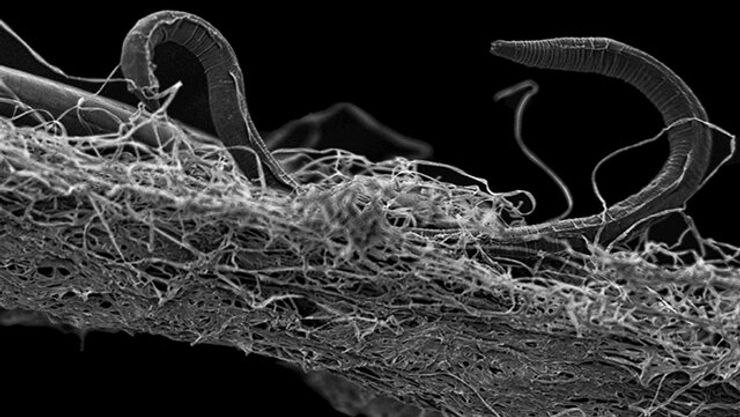By: Isabelle Wang
A pair of roundworms frozen in a chunk of Siberian permafrost were recently found by a scientist named Anastasia Shatilovich from the Institute of Physicochemical and Biological Problems in Soil Science RAS in Russia. Siberian permafrost is soil or other underground sediments frozen for two or more years. These two worms are estimated to have been frozen for about 46,000 years, and existed when woolly mammoths were still roaming the land.
The discovery of the worms led to the conclusion that nematodes, which is a category of worms, can survive in extreme weather and conditions. The worms were buried 130 feet deep into the permafrost. By simply putting them in water, the worms revived and started to wriggle. The worms were named Panagrolaimus kolymaensis after the Kolyma River, Russia, where it was found. Sadly, after being sent to Germany, they died just a few days later. Their life span is typically only a few days, and they died shortly after reproducing some offspring.
Scientists used radiocarbon dating, a method used by scientists to determine the age of objects containing carbon-bearing material, to determine that the worms were frozen during the late Pleistocene, around 45,839 and 47,769 years ago. The worms themselves were only around a millimeter long, but they were able to achieve a state called cryptobiosis which helped them resist extreme temperatures. Cryptobiosis is a metabolic state which extremophilic organisms use to survive through climate changes such as oxygen loss, and extreme temperatures. The Panagrolaimus kolymaensis nematodes had a key gene which was also found in Caenorhabditis elegans nematodes which allows them to go into cryptobiosis. “This led us, for instance, to understand that they cannot survive without a specific sugar called trehalose,” Dr. Kurzchalia, a professor emeritus at the institute who was involved in the study: “Without this sugar, they just die.”
Another researcher in the study, Dr. Philipp Schiffer of the Institute for Zoology at the University of Cologne, said when global warming is happening, we can learn a lot about adaptation to extreme conditions from nature, informing conservation strategies, and protecting ecosystems. Siberian permafrost has helped researchers understand how the body works by offering ancient viruses, mummified bodies and many microscopic creatures including nematodes for examination.











